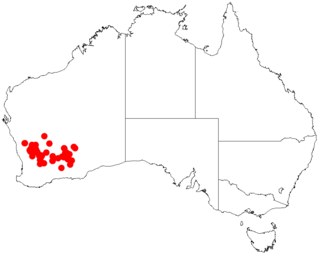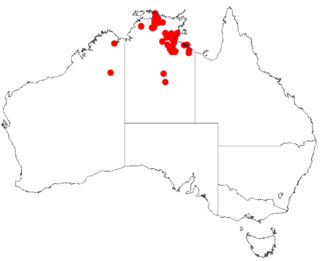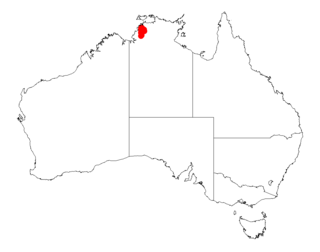
Acacia acradenia, commonly known as Velvet Hill wattle and silky wattle, is a shrub or tree belonging to the genus Acacia and the subgenus Juliflorae. It is native to northern and central Australia. The Indigenous Australian group the Nyangumarta peoples know it as walypuna the Alyawarr call it ampwey, the Jaminjung and Ngaliwurru know it as Mindiwirri, the Jaru as binbali or gundalyji, the Kaytetye as ampweye or arwele and the Warlpiri as ngardurrkura.

Acacia hamersleyensis, also known as Karijini wattle or Hamersley Range wattle, is a tree or shrub belonging to the genus Acacia and the subgenus Juliflorae. It is endemic to a small area in central Western Australia.

Acacia hopperiana is a small tree or shrub belonging to the genus Acacia and the subgenus Juliflorae that is endemic to western Australia.

Acacia mulganeura, commonly known as milky mulga and hilltop mulga, is a tree or shrub belonging to the genus Acacia and the subgenus Juliflorae that is endemic to arid parts of central and western Australia.

Acacia orthocarpa, also commonly known as Pilbara weeping wattle, needle-leaf wattle or straight-podded wattle, is a shrub or tree belonging to the genus Acacia and the subgenus Juliflorae that is endemic to tropical parts of northern Australia. The indigenous Nyangumarta peoples know it as yartupu.
Acacia paula is a shrub belonging to the genus Acacia and the subgenus Juliflorae that is endemic to a small area of north western Australia.

Acacia pellita is a shrub or tree belonging to the genus Acacia and the subgenus Juliflorae that is endemic to parts of tropical northern Australia.

Acacia sibina is a tree or shrub belonging to the genus Acacia and the subgenus Juliflorae the is endemic to parts of western Australia.

Acacia stipuligera is a tree or shrub belonging to the genus Acacia and the subgenus Juliflorae. It is native to arid and tropical parts of northern Australia.

Acacia dempsteri is a shrub belonging to the genus Acacia and the subgenus Phyllodineae endemic to south western Australia.

Acacia eremaea is a shrub or tree of the genus Acacia and the subgenus Plurinerves that is endemic to an area in western Australia.

Acacia inceana is a shrub or tree of the genus Acacia and the subgenus Plurinerves that is endemic to south western Australia.

Acacia conspersa is a shrub or tree belonging to the genus Acacia and the subgenus Juliflorae that is native to northern Australia.

Acacia doratoxylon, commonly known as currawang, lancewood, spearwood or coast myall, is a shrub or tree belonging to the genus Acacia and the subgenus Juliflorae that is native to eastern and south eastern Australia.
Acacia gracillima is a shrub or tree belonging to the genus Acacia and the subgenus Juliflorae that is native to north western Australia.

Acacia helicophylla is a shrub belonging to the genus Acacia and the subgenus Juliflorae that is native to northern Australia.

Acacia striatifolia is a shrub or tree belonging to the genus Acacia and the subgenus Juliflorae that is native to north eastern Australia.

Acacia pycnostachya, also known as Bolivia wattle, is a shrub or tree belonging to the genus Acacia and the subgenus Juliflorae that is native to eastern Australia.
Acacia rubricaulis is a shrub belonging to the genus Acacia and the subgenus Juliflorae that is native to a small area in north eastern Australia.

Acacia is a shrub or tree of the genus Acacia and the subgenus Plurinerves that is endemic to an area of northern Australia.

















